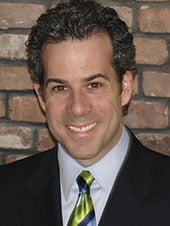Why Does Everyone Want To Be A "Food Addict?"

In my work, I find that one of the most common explanations people give for their struggle with diets and with obesity is “I’m a food addict.” When asked what this means, most people explain that their inability to maintain the weight lost from diets and the fact that most or all of the weight eventually returns is proof of their “food addiction.” Additional evidence they cite is that their eating is “all or nothing,” that they can completely avoid so-called “forbidden foods” or binge on them with regularity, but nothing in between.
This kind of reasoning is called reasoning from the converse. This is where you have a conclusion or an end state and you then go backwards to explain the cause and use the existence of the end state as proof of the cause. This invariably leads to circular logic that goes nowhere. Here’s how it works: “I am a food addict which explains why I cannot moderate my intake of certain foods, and my inability to moderate my intake of certain foods proves that I am addicted to them and am therefore an addict.” But does it? There is actually another, more accurate explanation.
There are three facts that must be considered:
1) 95% of people will regain most or all of the weight they have lost on a diet within five years.
2) Many, if not most diets teach avoidance of “forbidden foods,” not moderate consumption of them.
3) Very few diets or weight loss regimens are successfully maintained indefinitely.
These facts are very important to our discussion because they are true for almost EVERYONE who has tried to lose a significant amount of weight. Therefore, either everyone who has failed to keep their weight off following a diet or eventually resorts to eating “forbidden foods” is a “food addict” or there are other explanations for this phenomenon.
But why is it that so many of the people I meet are eager to call themselves “food addicts?” Most people are uncomfortable acknowledging that they are addicted to alcohol or illicit substances such as cocaine or heroin, so why is being a so-called “food addict” easier to acknowledge? I believe it is because the label “food addict” removes the feelings of guilt and shame that so many people experience when they regain weight after all of the work they expended in losing it. It is absolutely heartbreaking to lose the weight, have people notice that you’re thinner and then a year later you’ve regained the weight and everyone knows it. It would be very tempting to blame this on a disease called “addiction.” “It’s not my fault that I regained the weight and am obese again…I’m a food addict.” I can certainly understand the desire to be free from responsibility from your obesity or weight regain; however, it’s not necessary to fall back on the explanation that you are a “food addict.” Perhaps if we looked at the facts about weight loss, there would be no need for all of the guilt and shame and the resulting need to explain it away by calling it an addiction.
Review the facts that I mentioned earlier. The overwhelming majority of people regain the weight they have lost from a diet, very few diets teach moderate eating of “forbidden foods” (so you’re left with only knowing how to eat them or not eat them), and most people find it very difficult if not impossible to stay on a regimen of controlled eating for extended periods of time. These are the problems faced by almost all human beings who try to lose weight, not just those who are “food addicts!” So what is the explanation when someone actually succeeds in losing weight and keeping it off? Great question…and the answer is not that these rare souls are not “food addicts” or that they are “recovered food addicts.”
The National Weight Control Registry (NWCR) is an organization that keeps tracks of “successful weight losers” who have lost 30 pounds or more and have kept it off for at least one year. What should immediately catch your eye is that “success” is defined as losing 30 pounds and keeping it off for one year. So if losing 30 pounds and keeping it off for one year is considered “successful,” if you’re morbidly obese and manage to lose 100 pounds and keep that off for several years that would be incredibly successful! Extensive research has been done on these folks over the years and the most recent study has discovered 7 common habits which most of the 6,000 people studied have in common. 6,000 participants in a study is a strong number of people and one where the conclusions drawn are likely very robust.
Interestingly, the researchers noted that 90% of the folks in this study who finally lost the weight and kept if off had a previous history of losing weight and putting it back on. Therefore, the overwhelming majority of people were not successful on their first try. The seven habits of successful “losers” were: 1. Engaging in 200+ minutes of exercise of moderate intensity per week, 2. Limiting TV watching to less than 10 hours per week, 3. Eating a low-calorie, low-fat diet with less than 30% of calories from fat, 4. Consistency – relatively little food variety and the same daily pattern of eating, 5. Eating breakfast, 6. Avoiding emotional eating and binging and limiting consumption of fast food to less than once weekly and, 7. Monitoring yourself such as documenting calories and/or fat. Notice that every one of the seven habits is just that…a pattern of behavior. There is no mention of the characteristics of the 6000 people. It’s not about who they are, but rather what they did and continue to do.
So what do we make of this “food addiction?” Neuroscience is recognizing the difficulty human beings have in resisting certain foods that we can call “engineered foods” that are high in sugar, salt and other additives. These foods are designed by fast-food companies and food manufacturers to be irresistible because they cause certain reactions in the brain that make it hard for us to say no. But these are challenges for us all. In fact, mass consumption of these “engineered foods” is likely one of the great contributors to the obesity epidemic. They explain why we, as a society, are getting fatter. Perhaps we will discover that some individuals (for neurological or other reasons) have a more difficult time resisting these “engineered foods” enriched with sugar, salt and other additives, and that these individuals are the true “food addicts.” But what would knowing that you are one of these individuals change? What would a “food addict” do differently to lose weight and keep it off?
The addiction model says that the addict should completely abstain from using the substance or drug. Should “food addicts” avoid all food (impossible) or just the ones they are “addicted” to? And how would we know which ones those would be? The most commonly cited addictive “substance” in food is sugar, but we’re not at all certain. There is also another problem. Much of the research on binge eating indicates that designating certain foods as completely “forbidden” and avoiding them results in feelings of deprivation and their becoming even more desirable which often results in binging on them when you finally give into temptation.
Perhaps someday there will be treatments for true “food addicts” if “food addiction” actually exists. What is more likely however; is that these folks will simply have to work even harder than most of us to stick to the seven habits that are detailed above. In the meantime, consider giving up the label of “food addict” and instead, recognize that losing weight and keeping it off is a tremendous challenge, but an achievable one. If you’re thinking of beginning to address your own personal “battle of the bulge” either for the first time or the twentieth time, or if you’re feeling hopeless and thinking there is no point in even trying, fear not…most successful losers apparently made several unsuccessful attempts before they finally got it right. And if you are thinking of starting yet again…the seven habits detailed above are a great blueprint to follow.
I guess no one is free of responsibility of managing their weight and their trigger foods BUT there is an equal amount of responsibility that belongs on the doorstep of the food industry. Their well paid " food engineers, research and development and marketing personnel" know full well that brain chemistry is involved in the desirability of foods to humans. Did you ever hear of anyone with a broccoli addiction ?! No more likely the food of choice is a carbohydrate made in some lab and then manufactured and mass produced.
Our culture ( in the US) is bombarded with suggestive ads for fast, unhealthy foods millions of times a day. Parents even think they are giving their kids a " treat" to go to MD, when they are really setting them up for a lifetime of addicting carb craving, possibly leading to major health problems like heart disease and obesity.
I work with chronic disease patients regularly in my practice and not one of them wouldn't go back and make changes to avoid diabetes, limb amputation, congestive heart failure and kidney disease if they could.
Food is now in the hands of Big Business and the Pharma Industry. Choose your food wisely and realize that processed foods are not your friend and neither is the food industry that produces them. Their business is making you crave their products and create "Loyal Addicts" to increase their profits.
WANT to be a food addict?? WANT??
*deep breaths*
My entire life I've felt powerless to food, cravings, and impulsive bad decisions... I could never figure out why this was so hard for me. Why could other people put the fork down, but I ate until I puked? How could people turn down dessert and I couldn't? Why did I hide food? Why did I constantly feel guilty for everything I ate?
One day the light bulb went on! This is an addiction like anything else. That is why this was so hard for me... why it is still hard. It's an everyday battle but the surgery has helped tremendously!
I found the article to be a bit... condescending. Of course I recognize my own screw ups, I take responsibility for my actions, I seek solutions to my ADDICTION. That doesn't make me a "wanna-be" addict or some weak person looking for an excuse!
It takes a strong person to admit they have a problem/addiction, it takes an even stronger person to fight their addiction head-on instead of living in what is 'comfortable'. I could have continued the life I was living, eating to replace love, friendship, and hobbies... I could have gained more weight... I could have stayed where I was comfortable, stuck with what I've done my whole life. Instead I confronted my addiction and changed my life! If anyone thinks I or anyone else wants to be a food addict they can kiss my ever shrinking ass!
I'm sure "doctors" used to say the same thing about alcoholics. Just don't drink. Be strong! Replace the bad behavior with good behavior. Being an alcoholic doesn't excuse the individuals, but it does explain the behavior. Being a food addict (or an eating addict really) doesn't excuse my behavior. I own it, and I treat it daily. One of those treatments is WLS. One of those treatments is regular exercise. One of those treatments is a regimented eating plan.
I am addicted to eating. Yes, I can overeat carrots and broccoli. I can overeat salad. WLS will not make that addiction go away.
Not everyone who is fat has an addiction. Not every food addict is fat.
I smoked for 15 years but I was never addicted to nicotine. I just stopped smoking one day. Never jonesed for a cigarette after. Could always take it or leave it. But I don't have the audacity to say that nobody is truly addicted to smoking. I'm lucky.
When it comes to food, I'm not so lucky.






gowalking 10,790
Posted
This is not about love of food. This is about an abnormal relationship with food. You are obviously not a food addict so it's understandable that you don't get it.
Oh...and about picking up cigarettes from the ground, ash trays, etc. I've done some pretty disgusting things in order to get in my food fix. I won't go into details but I've seen other posts from folks who are also ashamed of some of their behaviors regarding food and let me tell you friend, it's not pretty.
Share this comment
Link to comment
Share on other sites